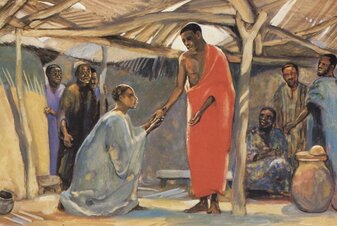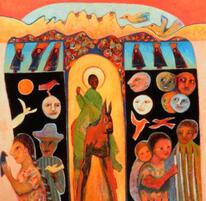
John 20:19-31
Let’s state the obvious, even in the midst of the season of Easter: We live in a wounded world. The war in Ukraine is dragging on. Climate crisis goes unchecked. Interwoven into these concerns is the fall out of the pandemic – economic problems, inflation, high gas prices, supply chain issues, levels of gun violence that we haven’t seen in years. 40.3 million victims of human trafficking. 26.6 million refugees worldwide. And not least of all, let us not forget 175,000 people who have on average who have died of hunger and hunger related disease this past week. That doesn’t even touch upon the wounds carried by communities. The wounds passed down by families. The wounds carried in the bodies and spirits of individuals. Wounds are everywhere. What wounds weigh on your soul?
The wound that ravaged my family is a common one: alcoholism. It was a wound that destroyed my parents’ marriage, left us briefly homeless and financially unstable. For years my four older brothers had morning and evening paper routes around their school schedule to help put food on the table. Alcoholism was a contributing factor in two of my brothers’ deaths. My eldest brother, Sean, died when I was 15 due to an overdose in the midst of a drunken stupor. Another brother, Chris, died a year later, in an automobile accident in which alcohol played a factor. I am positive that each person here could tell accounts of wounds endured during a lifetime of living. Is there honestly anyone present that hasn’t face a trial or tribulation that hasn’t left a mark on your soul? Anyone? I didn’t think so.
For this reason, I treasure the passage from John that we have read today. Because of the trauma of life, the disciples lock themselves up, for fear of the Jewish leaders. They saw how these leaders brutally treated Jesus and got him sentenced to death. It is natural for them to think that they were next to be disposed of. These religious leaders were not going to stop at anything. They were intent on annihilating the Jesus movement once and for all. They were a wounded group. They felt the pain of Jesus’ death. They felt the guilt of their lack of bravery in the hours that Jesus needed them. They were confused at the reports from the other disciples who proclaimed that Jesus had been risen from the dead, the stone was rolled away, the tomb was empty. Never a shaken up, wounded bunch had been seen. Yet in this dark hour, Jesus appears, bringing peace. Neither locked doors or locked hearts cannot keep Jesus away. Jesus doesn’t bring reproach. Jesus doesn’t criticize. Jesus doesn’t dwell on their mistakes. Jesus brings peace. But Jesus brings another thing. Jesus, in his resurrected, body, brings his wounds. Through his wounds, Jesus brings life.
Thomas was not with the other disciples when all of this occurred, so they report to him what has happened using the same language Mary had earlier used, “We have seen the Lord.” But Thomas declares: “I won’t believe it unless I see the nail wounds in his hands, put my fingers into them, and place my hand into the wound in his side.” Frankly, who among us would react differently?
We first hear from Thomas, called the Twin, toward the end of Jesus’ earthly ministry at the time that Jesus goes to Bethany to raise Lazarus from the dead. The religious leaders, react in rage to Jesus’ miracle and redouble their plans to kill Jesus. On that occasion Thomas said to his fellow disciples: “Let us also go, that we may die with him” (Jn 11: 16). His determination to follow Jesus reveals his total readiness to stand by Jesus.
A second comment by Thomas is recorded at the Last Supper. On that occasion, while predicting his own imminent departure, Jesus announced that he was going to prepare a place for his disciples so that they could be where he is found; and he explains to them: “You know the place where I am going” (Jn 14: 4). It is then that Thomas intervenes, saying: “Lord, we do not know where you are going; how can we know the way?” (Jn 14: 5). Jesus responds with his famous declaration: “I am the Way, and the Truth and the Life” (Jn 14: 6).
I don’t know about you, but Thomas comes across as a straight shooter, grasping and assessing the situation accurately. So, today for the third time Thomas speaks, saying, “Unless I see.” He is just stating that he wants to see what the rest of them saw: the wounds in Jesus’ hands and side. He is the one who was ready to die with him. The one wanting to know the way. He just wants to know the way. Thomas knows the way to Jesus is through his wounds of the cross. Jesus very much obliges and appears the next time when Thomas is with the community. See and believe, Thomas, Jesus says. At this point Thomas goes further than any other disciples by confessing, “My Lord and my God.”
Our passage today tells us that we must not be afraid to touch our wounded places for these are precisely the places where Christ is most clearly revealed. Jesus choses to be found in wounds. After all, Jesus could have easily chosen a resurrected body free of wounds. A whole body in its prime. But Jesus chose instead that his wounds be visible. The scarred Jesus does not wait until we’re all beautiful and ready for church to meet us. He chooses to come to us in the midst of pain, illness, and injury. We find him in the wounds of life. He is with the abused, the hurt, the refugee, the grieving, the lost, the struggling. Unless we see Jesus in the suffering of the world, we will not find him. For that is where Jesus wants us to find him.
Not in the corridors of power but in the homeless shelter. Not on the red carpet, all coiffed and buffed, but in the hospital bed, the prison cell. Not at the Met Gala overflowing with riches and fancy foods, but at the soup kitchen. Not in some mansion filled with all the wonderful amenities of life, but in your broken heart and mine. This doesn’t mean that Jesus doesn’t want us to have the good things of life and be happy. Jesus just knows that the loneliest place, the most isolated place in life is the wounds we fear to reveal, those wounds that hold us bound, keep us locked.
The Jesus who walked on this earth did not see himself as set apart from the world. Rather he willingly entered into the pain by extending his hand to those hurting, by living among us, and then dying. Jesus was fully human and experienced the pain of living in a fallen world. Peter teaches us that Jesus carried in his own body the sins we committed. He did this so we might live in righteousness, having nothing to do with sin. By his wounds we are healed (1Peter 2:24).
Do you know the sign language for Jesus? It is this: put your finger into the middle of the palms of each hand moving back and forth…from first one hand and then to the other. Jesus is known by his wounds. So where are you feeling wounded today? Where is fear keeping you locked down? Where do you need peace? Let Jesus touch those places. As you feel Jesus’ touch, allow the healing power of the Risen Lord to fill you. Then in turn touch others. Let our wounds become the conduits of grace to others, signs that no matter what we have gone through, we can heal, we can be healers, because Jesus, Our Wounded Healer, stands in our midst, and because of this, we have life in his name. Amen
https://seedbed.com/emily-matheny-touchremember-john-2019-31/
https://pcpe.smu.edu/blog/preaching-john-20-19a-31-in-the-midst-of-the-pandemic



 RSS Feed
RSS Feed